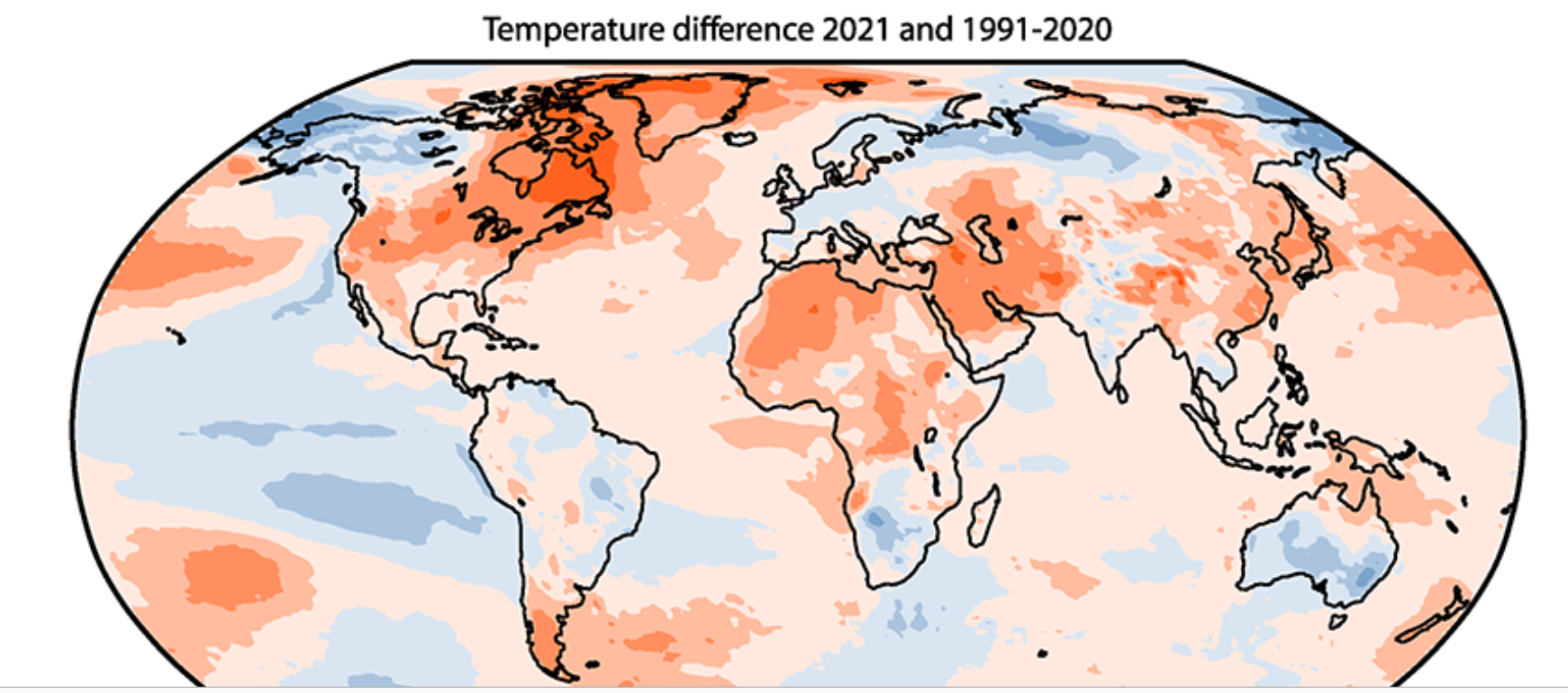
Climate emergency: Last seven years were the seven warmest on record by a “clear margin”
Once again the scientific evidence of our climate emergency has been made totally and utterly clear.

C: climate.copernicus.eu
Once again the scientific evidence of our climate emergency has been made totally and utterly clear.
Yesterday, some of Europe’s leading climate scientists released new data “showing that the last seven years globally were the seven warmest on record by a clear margin.”
While 2021 was not the warmest of the past 7 years, (due in part to the cooling effects of La Niña), it was still the fifth warmest year on record. But other records were broken too. Europe experienced its warmest summer on record, with record temperatures recorded in Sicily.
Meanwhile, during the exceptional heatwave in western North America in June, “maximum temperature records” were “broken by several degrees Celsius, resulting in the warmest June on record for the continent.”
Carlo Buontempo, Director of the Copernicus Climate Change Service, which undertook the analysis, said that “these events are a stark reminder of the need to change our ways, take decisive and effective steps toward a sustainable society and work towards reducing net carbon emissions.”
To join records being broken on land, we also had record temperatures in the world’s oceans, which have been absorbing about a third of the carbon dioxide being pumped into the atmosphere. Last year witnessed the hottest ocean temperatures ever recorded.
It is the sixth consecutive year that this record has been broken, according to the research published in Advances in Atmospheric Sciences.
Writing in the Guardian, one of the scientists involved in the research tried to put the ocean heating into numbers: “the oceans have absorbed heat equivalent to seven Hiroshima atomic bombs detonating each second, 24 hours a day, 365 days a year.”
The scientist, John Abraham, a Professor of Thermal Sciences at the University of St Thomas in Minnesota, added that “I have plotted the ocean heat, measured since the late 1950s, and the clear, persistent rise over the past three to four decades is unmistakable evidence of an Earth that is out of balance.”
Record temperatures have real life consequences, which cost lives and caused billions of damage. According to NASA, the U.S. was hit with 20 billion dollar disasters in 2021 that caused the deaths of at least 688 people and cost more than $145 billion in damage.
(2 of 6) The U.S. was hit with 20 #BillionDollarDisasters in 2021 that caused the deaths of at least 688 people and cost more than $145 billion in damage, according to @NOAANCEI #StateOfClimate report: https://t.co/X3FWr7YeDI pic.twitter.com/LFIaxS5k2z
— NOAA (@NOAA) January 10, 2022
Meanwhile in the Philippines, in the days running up to Christmas, Super-typhoon Rai ravaged the country. While the country experiences some twenty typhoons a year, Rai was deeply destructive, bringing torrential rains, violent winds, mudslides, floods, and storm surges to central-southern Philippines.
It affected some 16 million people across the six worst hit regions, leaving about 2.4 million people in need of assistance, killing 258 people, and displacing 631,000. It has largely been ignored by the mainstream media.
We know climate change adversely impacts the poor and voiceless. As Gustavo González, Resident Coordinator and Humanitarian Coordinator for the Philippines states: “We all are aware that disasters like this disproportionally affect the most vulnerable in our communities, including children, women and girls, women and child-headed households, people with disabilities, older people, LGBTIQ persons and indigenous peoples.”
We know this, we know the science that is telling us we are in a climate emergency. But still we drill.
And as the oil industry continues to push gas as a bridge fuel, countries in Asia continue to consumer. As Bloomberg noted last week: “The hunt for natural gas is spreading to Asia’s developing economies, with India and Indonesia adding to the global demand pressure… The rising interest from South and Southeast Asia adds to elevated demand from Europe, which pushed prices to record highs last month.”
Unless we rapidly transition away from fossil fuels, the destructive cycle of fossil fuels fueling extreme weather will continue. Other leading climate scientists are already warning that 2022 is expected to be one of the warmest years on record too.
It is no wonder that many scientists are in despair. And they are writing about that despair. Another scientific article has just been published called the “tragedy of climate science.” The authors write: “The tragedy of climate change science is that at the same time as compelling evidence is gathered, fresh warnings issued, and novel methodologies developed, indicators of adverse global change rise year upon year.”
And that is exactly what is happening. We have to hold the oil industry to account. They caused this modern day tragedy.
